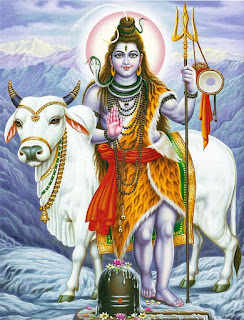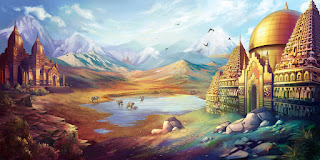“Hello, everybody and welcome to the show! As your host tonight, I’ll be conducting a
few interviews with the deities’ vahanas!
I’m sure you’ve often wondered what it would be like to be the vehicle
of a god! Now we have the mounts
themselves here to answer questions!”
“First up we have Nandi, Lord Shiva’s vahana! Nandi, how are you today?”
The elaborately painted white bull snorted and tossed his
head. “Same old, same old. I’ve been guarding Shiva’s palace for the
past three thousand years, give or take a few hundred. Stuff gets old. I used to think it was so exciting working
for Shiva, you know? But now I’m bored.”
“Bored? Really? I thought demons attacked all the time! I mean I know Ravana did . . .”
“Ha! Demons don’t
scare me, especially not Ravana! He
practically ran after I cursed him, but anyway Ravana’s old news. Haven’t had anything nearly that heart-pounding
in a thousand years.” The bull shook his
head sadly.
“Wow, I had no idea.
Have you considered maybe leaving Shiva’s service to find something a
little more suited to you?”
“No! Absolutely not!” Nandi beat his hooves on the ground. “I could never leave Lord Shiva! He saved me when I had nothing and has been
nothing but helpful. Maybe it is getting
monotonous now but I would never leave him.”
“Such devotion! How
did that come about?”
“I used to be a human, actually. When I was only a young boy, two sages
visited my father. They told him that I
would not have a long life. My father
was extremely alarmed but didn’t know what to do. He broke down and told me what they had
said. I told him not to worry and that
Lord Shiva would protect me. So, I
prayed to Lord Shiva every day, and finally he rewarded my devotion with a
boon. I asked that I be allowed to pray
for one more year for him. When that
year ended, I asked for the same boon, and again and again. Finally, Lord Shiva recognized my devotion
and made me an immortal bull that was sworn to protect his home forever. And that is why I will never leave him, no
matter what happens.”
The host wiped away a tear surreptitiously. “That was beautiful, thank you, Nandi. It was great hearing from you.” The bull inclined his head and walked off the
stage.
“Next we have Airavata, the last winged elephant and the
mount of Indra! Airavata, how did you
come into Indra’s service?”
The winged elephant gracefully folded his wings behind his
back and gestured with his trunk. “My
story is very similar to Nandi’s, in that Indra too showed me great mercy. I was grievously injured after a battle with
a rakshasa, and Indra found me and saved me.
In return, I will serve him for the rest of my life.”
“I am sure he does not regret his decision. Now, there have many been many rumors
surrounding your birth or creation. So,
let’s clear this up for the viewers.
What is your actual origin story?”
The elephant chuckled.
“It may be less interesting than you hoped. I was not born from the churning of the Ocean
of Milk as some believe. Nor is my
mother Iravati as the Ramayana claims.
In fact, I emerged along with 7 other brothers and sisters from an egg
at the dawn of time. Brahma himself
watched over our hatching and birth.”
“Forgive me if I’m too forward, but what happened to your
brothers and sisters? You are the last
winged elephant left, are you not?”
Airavata sighed. “Yes,
it’s true. Unfortunately, one of my
siblings offended a sage. Enraged, the
sage proclaimed that he and his kind would never fly again. He only spared me because I was the king of
elephants and Indra’s mount.”
“I’m so sorry for what happened, and thank you for telling
us about it. It was great hearing from
you today, Airavata.”
“Thank you for having me,” the elephant rumbled as he left
the stage.
“Finally, our last guest!
Mushika, mount of Ganesh, welcome!”
“It’s great to be here,” the giant mouse squeaked.
“Now, Mushika, I’m sure you know what my first question will
be. Just how did you become the mount of
Ganesh?”
The mouse laughed. “Well,
my story is a bit different from the others.
You see, I was actually a rakshasa originally. I wasn’t a good, devoted person at all. In fact, I got into a lot of trouble. Well, one day Ganesh was fed up with my
nonsense. He decided to put a stop to my
bad behavior and captured me with a golden lasso.”
“Wow, what a story!
So, what made you decide to continue following Ganesh? Would you go back to being a rakshasa?”
“Hell no,” Mushika said.
“I love being Ganesh’s vahana.
Sure I have a bit less freedom than I did before, but I have so many
more privileges. I can go anywhere with
Ganesh, and he depends on me a lot too.
It’s not one-sided like a lot of people think. I give him power to control useless
thoughts. Plus, all of the gods have to
bow down before me too. It’s pretty
great. I wouldn’t give it up for
anything.”
“Thank you for that incredible insight on what it’s like to
be a vahana! It was wonderful having you
on the show tonight, Mushika.”
“It was a pleasure being here.” The mouse scampered off the stage.
“Thanks for tuning in folks!
Next week, I’ll be back with the consorts of the gods! Ever wanted to hear Sarasvati or Lakshmi’s
perspective? Now you’ll get the chance,
next Wednesday 8:00 central!”
Nandi and Lord Shiva. Web Source.
Author's Note: At the end of Divine Beings, they had a little section about all of the vahanas of the different gods, and I was so intrigued! It was so cool to hear about how the gods rode around on them and how they could even give them more powers like Mushika said! The little backstories that the mounts themselves say are all taken from the graphic novel. The rumors about Airavata's birth are from the different retellings of his creation. The part about Mushika liking the gods bowing to him is from his time as a rakshasa where he offended a sage, who cursed him to be a giant mouse. The sage later relented and told him that the gods would eventually bow down to him, which they did as he was the mount of Ganesh. Airavata's sibling's story is also from a myth! One of the winged elephants tried to perch on a tree but broke the branch and fell on a sage who cursed him to lose his wings. Airavata was only spared because he was the king of the elephants (I put in that he was also the mount of Indra but at that time he wasn't yet). All the rest is directly from the graphic novel!
Bibliography: Divine Beings. Reading Guide.











